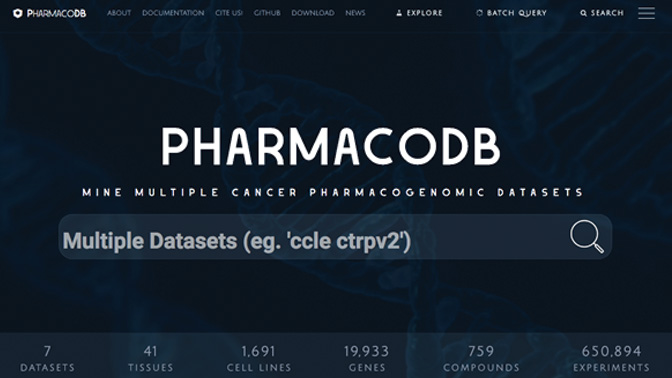Home page Description:
Database compares anticancer drug screening studies to support the discovery of new therapies.
Posted On: October 23, 2017

Image Caption:
PharmacoDB is a database containing a large compendium of genomic and pharmacological data, freely available at https://pharmacodb.pmgenomics.ca/
As a society, we have invested a lot in the development of anticancer drugs. Some of these drugs are exceptional at treating and even curing patients. However, only a subset of the patients will benefit from the majority of drugs.
Part of the problem is that it can be difficult to predict which drugs are most likely to benefit individual patients based on the unique features of their tumor. To help, researchers have identified predictors, also referred to as 'biomarkers'—formidable tools used by clinicians to decide on treatments for individual patients.
There is a catch though. Given the complexity of cancer, clinical trials that aim to identify new biomarkers must be performed using large numbers of patients. When this is not possible, alternative approaches must be taken.
One widely used approach involves cancer cells that have been extracted from patient tumours. These cells are modified so that they can grow outside of the patient indefinitely. The genetic make of these cells, known as ‘cancer cell lines’, has also been deeply characterized over the years. This has laid the foundation for large-scale drug screening studies, where hundreds of cell lines are treated with many drugs to identify new therapies for specific cancer types.
However, as PM Cancer Centre Scientist Dr. Benjamin Haibe-Kains and his team showed in a paper published in Nature in 2013, these studies do not always agree with each other. “To know whether a drug is truly effective at killing a cancer cell line, we look for consistency across studies by us and others,” he says. “Consistent data are necessary to develop good biomarkers that are predictive of drug response.”
To address this problem, Dr. Haibe-Kains’ laboratory decided to implement PharmacoDB, a database that assembles the largest drug screening studies to allow researchers not only to compare these studies, but also to check their own experimental data against the database.
“I saw the challenges inherent to these drug screening data, and I wanted to develop a tool to address them and aid the scientific community in building better biomarkers”, says Mr. Petr Smirnov, student in Dr. Haibe-Kains’ lab and first author of the manuscript describing PharmacoDB.
As drug response data are generated and added to the array of large datasets available world-wide, assembling this data is a major step toward the development of more and better predictors of drug response—and a key step towards developing new strategies to conquer cancer.
This work was supported by the Canadian Institutes of Health Research, the Terry Fox Research Institute, the Natural Sciences and Engineering Research Council of Canada, the Ontario Institute for Cancer Research, Stand Up To Cancer Canada and The Princess Margaret Cancer Foundation.
PharmacoDB: an integrative database for mining in vitro anticancer drug screening studies. Smirnov P, Kofia V, Maru A, Freeman M, Ho C, El-Hachem N, Adam GA, Ba-alawi W, Safikhani Z, Haibe-Kains B. Nucleic Acids Res. 2017 Oct 9. doi: 0.1093/nar/gkx911

Dr. Benjamin Haibe-Kains, Scientist at Princess Margaret Cancer Centre, is the creator of PharmacoDB—a unique resource that that allows users to view and compare their genomic and pharmacological data to existing studies.




